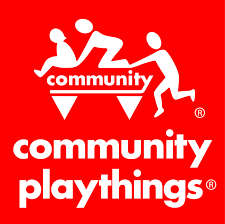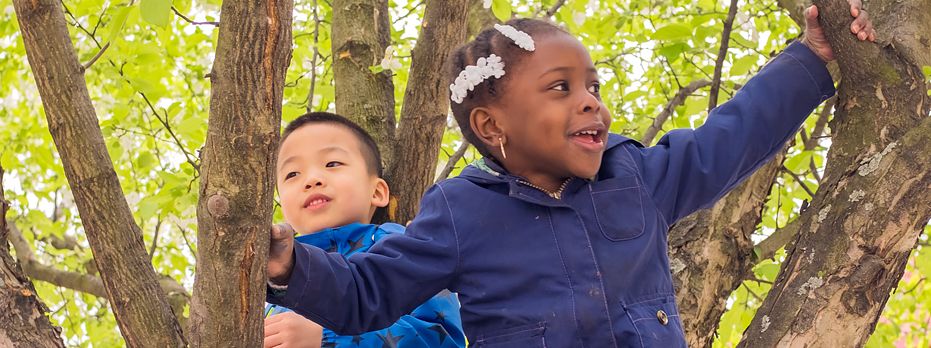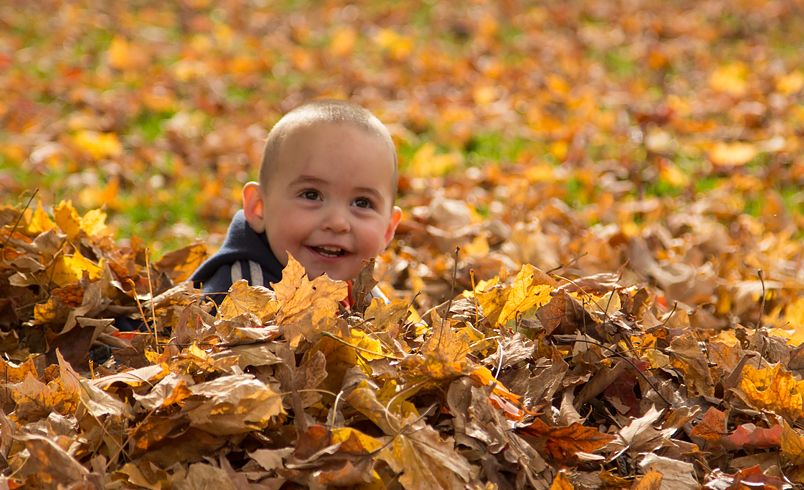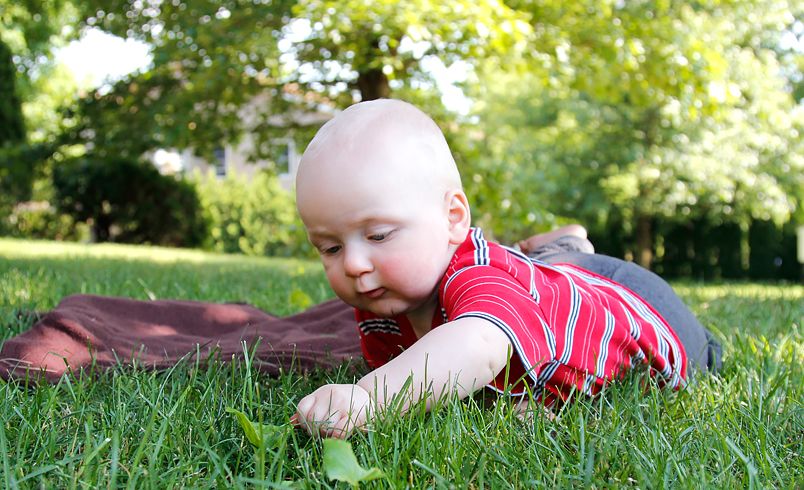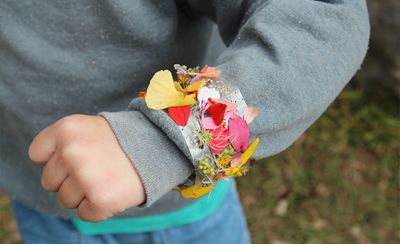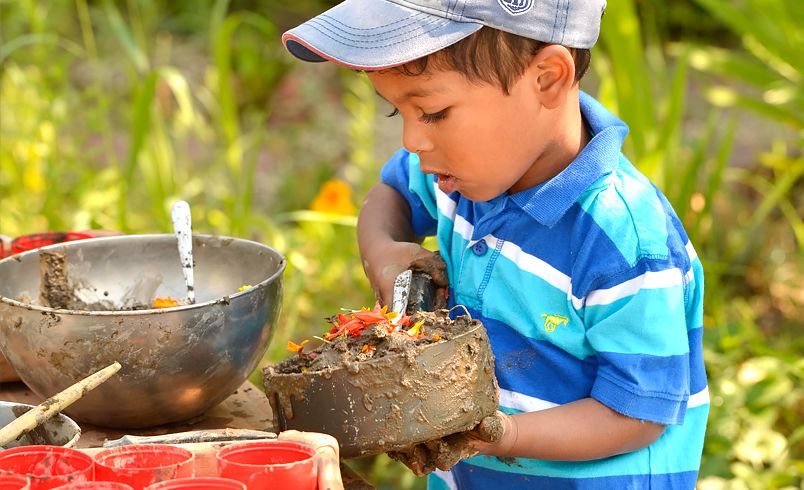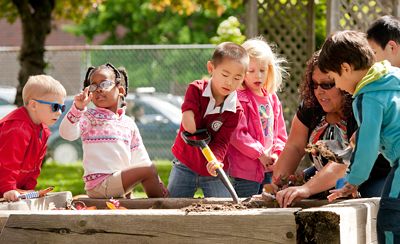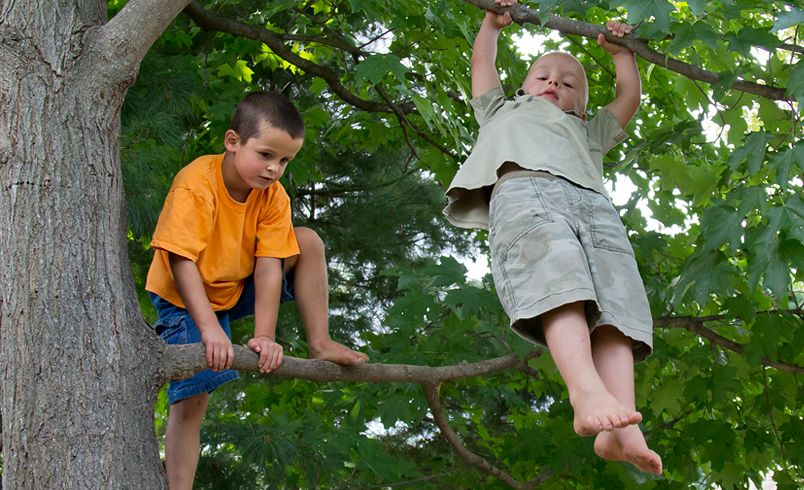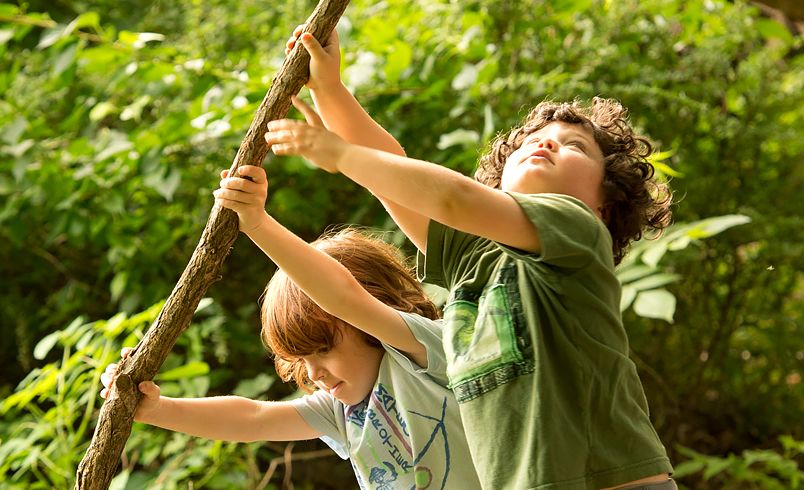Learning Naturally
How Spending Time in Nature Supports Executive Functioning
| October 2017With technology evolving at breath-taking speed, we must prepare children to live in a future world that we can neither predict nor imagine today. Who knows what new advances and technologies will be available when today’s young children reach adulthood? To help young children become college and career ready, we need to encourage them to be deep thinkers and to approach problems with flexibility and creativity. Children will need to focus their attention on what is important while ignoring other distractions. It’s not just about knowing facts, we live in a world where facts are at our fingertips. It’s about being able to use what we know; to apply our knowledge to meet the demands of the current situation.
In short, we need to facilitate the development and use of executive functions. These functions help us analyze, plan, and reflect on our actions in order to achieve a goal. These skills combine our intellectual, emotional, and social abilities. Executive function skills are prerequisites for success in most facets of life. Many current studies indicate that executive function skills lead to greater academic success. Children who have strong working memory, better mental flexibility, and greater self-control make more academic progress than their peers (Kamkar & Morton 2017). Strong executive function skills in early childhood are linked to higher math, vocabulary, and literacy skills (Harvey & Miller 2017). In order to prepare children for the world of tomorrow, we need to focus on helping them develop and refine executive function skills.
While executive functions are important for academic and life success, it is clear that, unlike tireless machines, our brains need regular rejuvenation and care. It is easy to become weary in our fast-paced, digital world. Our hectic, frenzied lives may be the very reason we need to take time to connect with nature. Connecting with nature allows us to feel restored and enhances our mental performance (Bratman et.al 2015). There are also clear indicators that spending time in nature supports the development of executive function.
Increasing evidence shows that positive experiences in nature lead to numerous cognitive, emotional, and physical benefits. Children have better concentration, show improved academic performance, have less aggression, and are at a reduced risk for obesity when they have opportunities to spend time in nature (American Institutes for Research 2005; Faber Taylor & Kuo 2011). All of these factors underscore the importance of providing children opportunities to connect with nature on a regular basis.
In today’s world where children are becoming increasingly disconnected from nature, this is even more important. Childhood is often the time when lifelong relationships with nature are built. Taking part in relaxed, pleasant nature experiences builds positive feelings and happy memories for children. But there are other benefits as well. Spending time in nature helps children develop observation skills and enhances creativity (Crain 2001). The more attention we give, the deeper and richer our learning. When children learn to pay close attention to details, they are strengthening their focus and self-control, which are key aspects of executive function. Research shows that children with attention deficit disorder are better able to concentrate and follow directions after playing in an outdoor setting than they were after playing indoors (Martensson et. al 2009).
Playing in nature encourages children’s social interaction with one another and helps children improve their social skills by encouraging positive relationships and facilitating their language and communication skills (Pyle 2002). Children who regularly play in natural environments show better physical coordination, fitness, and motor skills than children who spend less time outdoors (Fjortoft & Sageie 2001). These findings are linked to academic success because children require a solid foundation of mental and physical health to build academic skills.
Spending time outdoors supports development of executive functions in several ways. Developing executive function skills is a combination of brain development and life experience, for this the early years are crucial. Nature play focuses on problem solving, creativity, and emotional and intellectual development. Children are natural scientists, experimenting and exploring to see how the world works. Providing time and opportunity to explore the natural world encourages children to focus their attention, utilize their working memory, and practice basic self-inhibitory control. Skills that are directly related to executive functions.
Spending un-structured time in nature reaps the most benefits. When children are allowed to engage in less-structured time outdoors, they are able to develop and carry out their own goal-directed actions. In fact, the more time children spend in less structured activities, the better their self-directed executive function (Barker et al 2014).
Here are some ways to support children’s development of skills related to executive functions:
Provide sensory experiences
At the earliest ages, provide sensory experiences for infants to explore natural materials. Let them touch tree bark, grasses, and stones. Provide the language to further understanding of what they are experiencing. Talk about the coolness of the stones or the roughness of the bark. Enjoy the shared attention of gazing at the drifting clouds or the chirping of nearby birds.
Create spaces for discovery
As children grow older they are motivated to more fully explore their environment, so creating a safe space for discovery is important. Take children on “adventures” by exploring nearby natural landscapes. These adventures don’t need to be extravagant or time-consuming. A simple walk through a wooded area or a visit to a nearby pond can be all that is needed. Provide children with a “treasure bag” to collect items while on a nature walk. Then examine and discuss what was collected. Create a nature bracelet using wide tape. Create a photo book of your adventures so your children can tell and retell the story many times.
Give them something to talk about
Language is closely related to executive functions. Provide children experiences in nature to give them something to talk about. Sit and watch ducks swimming across a pond. Encourage children to talk about what they observe and ask questions. Help them identify ways to find the answers to their questions. Engage in conversations with children about what they are experiencing and encourage them to express plans about what they want to do next. Let them take the lead during a nature walk by deciding what path to follow, and engage their working memory by encouraging them to retrace their steps on the way back. Provide the language for children to formulate and express their thoughts. Play games that involve cause and effect. Collect a small variety of natural objects and throw them in the water to see what happens. Compare the resulting splash of the different materials. Create mud pies and mud soup using different ingredients and discuss which make the best “recipe”.
Encourage gardening
Encourage children to help plan and create a garden. Let them choose what plants to grow and design the plot. You could focus on different colors, scents or textures, or plan with the end in mind and grow a pizza or salsa garden! Encourage children to help you weed the garden. Comparing and contrasting the weeds and other plants can be turned into a sorting and matching game. As children decide which plants are weeds, they are using the core features of executive functions: working memory, cognitive flexibility, and inhibitory self-control. Use the garden produce to try out different recipes—you might be surprised at children’s willingness to try new foods that they grew themselves!
Provide physical challenges
Include lots of physical movement and motor challenges like climbing trees or creating a nature obstacle course. These types of activities provide opportunities for planning, problem-solving, and working together with peers. Children also feel an inherent sense of pride and accomplishment upon mastering such challenges. You can balance these active times with quiet activities like taking a listening walk through a natural area.
Inspire constructive play
Provide open-ended, loose parts like small tree branches or bamboo poles for children to use to create forts. In order to accomplish the task of building a fort, children must plan, work together, focus, and problem solve. These are important skills children will use again and again throughout their lives to accomplish their goals.
Connecting children to the environment and providing varied opportunities to spend time in nature can result in lifelong benefits for children. These benefits include better physical health, a sense of social connectedness, increased creativity, and reduced stress. Cognitive skills, including the development and refinement of executive function skills, are also supported by spending time in nature. There may be benefits for the teachers too. Teachers that regularly take their students outside report more confidence in their teaching, use more innovative teaching strategies, and are more likely to retain their enthusiasm for teaching than those who stay indoor (Suzuki 2014). A “natural” remedy for teacher burnout if you will. So do yourself and the children a favor and head outside! You’ll support children in developing a love of learning as well as a love for the natural world!
References
American Institutes for Research. 2005. “Effects of Outdoor Education Programs for Children in California.” American Institutes for Research: Palo Alto, CA. http://www.sierraclub.org/youth/california/outdoorschool_finalreport.pdf (Volume 1)
Barker, J., A. Semenov, L. Michaelson, L. Provan, H. Snyder, and Y. Munakata. 2014. “Less-structured time in children’s daily lives predicts self-directed executive functioning.” Frontiers In Psychology 5(593): 1-16. doi: 10.3389/fpsyg.2014.00593
Bratman, G.N., J.P. Hamilton, K.S. Hahn,, G.C. Daily, and J.J. Gross. 2015.“Nature experience reduces rumination and subgenual prefrontal cortex activation.” PNAS 2015 112 (28): 8567-8572; doi:10.1073/pnas.1510459112
Crain, W. 2001. “Now Nature Helps Children Develop.” Summer.
Fjortoft, I. & J. Sageie. 2001. “The Natural Environment as a Playground for Children: Landscape Description and Analysis of a Natural Landscape.” Landscape and Urban Planning 48(1/2): 83-97
Faber Taylor & Kuo. 2011. “Could exposure to everyday green spaces held treat ADHD? Evidence from children’s paly settings.” Applied Psychology: health and Well-Being. 3: 281-3-3. doi: 10.1111/j.1758-0854.2011.01052.x
Harvey, H.A. & G.E. Miller. 2017. “Executive function skills, early mathematics and vocabulary in head Start preschool children.” Early Education and Development. 28(3): 290-307.
Kamkar, N.H. & J.B. Morton. 2017. “CanDID: A framework for linking executive function and education.” Frontiers in Psychology. https://doi.org/10.3389/fpsyg.2017.01187
Martensson, F., C. Boldemann, M. Soderstrom, M. Blennowe, J.E. Englund, & P. Grahn. 2009. “Outdoor environmental assessment of attention promoting settings for preschool children.” Health & Place. 15: 1149-1157. doi. 10.1016/j.healthplace.2009.07.002.
Pyle, R. 2002. Eden in a Vacant Lot: Special Places, Species and Kids in Community of Life. In: Children and Nature: Psychological, Sociocultural and Evolutionary Investigations. Kahn, P.H. and Kellert, S.R. (eds) Cambridge: MIT Press
Suzuki, D. 2014. “Learning in nature is good for teachers and students.” http://www.straight.com/news/729771/david-suzuki-learning-nature-good-teachers-and-students
